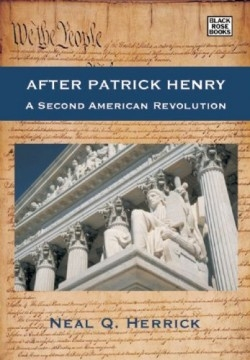
After Patrick Henry
A Second American Revolution
Attend a party, read a blog, skim the editorial page of a newspaper, and you’ll be treated to a bevy of opinions about the U.S. government and what it does wrong, or, less often, what it does right. But how many of these arguments are truly informed? How many stem from a careful scrutiny of the most important document in U.S. history to outline the supreme law of the land—the Constitution?
One book that cannot be accused of a lack of research is Neal Q. Herrick’s After Patrick Henry: A Second American Revolution. Here Herrick, a retired academic and author of two other books, offers an intriguing, in-depth argument concerning the ways in which the executive branch of the government has been allowed to overstep the law with no repercussions.
Whether the executive branch is illegally declaring war against other countries—solely the job of Congress—or perjuring itself, it’s the role of senators and representatives to impeach and judge on the basis of the constitutional law. Our system of checks and balances has dissolved into ineffectual displays of incompetence; politicians tend to ignore the call for impartiality and vote along party lines. Herrick writes, “We must revitalize our failed impeachment provisions in order to persuade our civil officers to resist the temptations pf power and money and, instead, do the work we pay them for.”
After Patrick Henry stretches far and wide in its assessment of the American government; it’s a sign of Herrick’s talent as a writer that readers will find his pages highly accessible and often illuminating. He braids a multitude of sources—quotes from representatives, senators, academic experts, judges, and the words of the framers themselves—into a cohesive argument for the return of attention to the Constitution.
The solution to our current problems, Herrick believes, lies in an amendment, and the amendment has to come from the people by whom the constitution was written. Only by returning power to the citizens can we return to democracy. Readers will find much in this volume to stimulate wonder; people will find it hard to return to a state of blind acceptance after reading Herrick’s call to action. “The price for neglecting this ultimate responsibility is likely to be higher than we want our children and their children to pay.”
Review Date: December 2009
Disclosure: This article is not an endorsement, but a review. The publisher of this book provided free copies of the book and paid a small fee to have their book reviewed by a professional reviewer. Foreword Reviews and Clarion Reviews make no guarantee that the publisher will receive a positive review. Foreword Magazine, Inc. is disclosing this in accordance with the Federal Trade Commission’s 16 CFR, Part 255.
